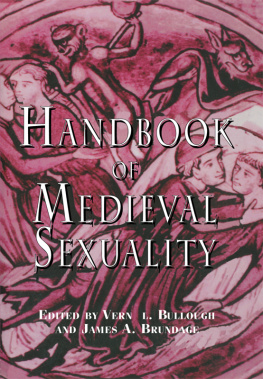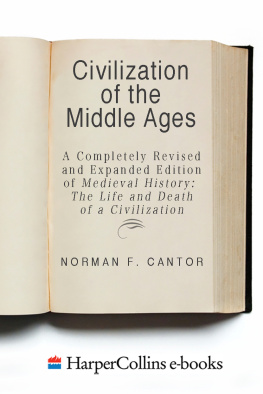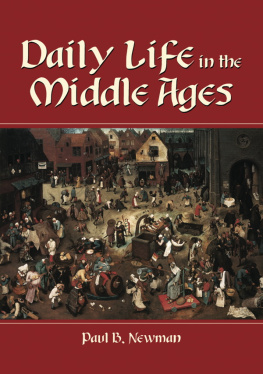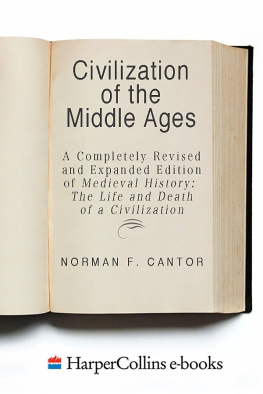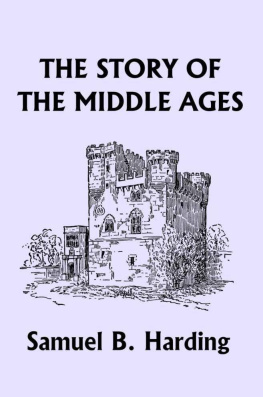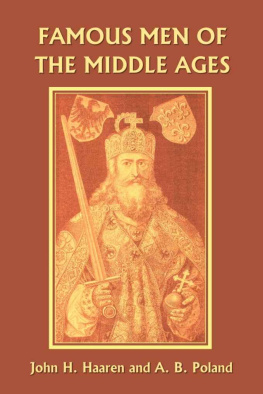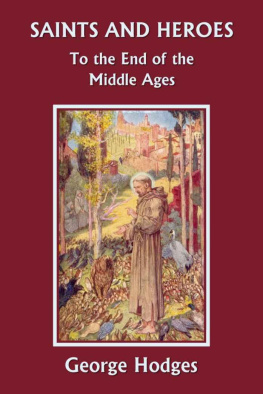INTRODUCTION
..................
HISTORY IS COMMONLY DIVIDED, FOR convenience sake, into three great periodsancient, medieval, and modern. Such a division is, to this extent, a natural one that each of these periods in a large view of it is distinguished by certain peculiarities from the others. Ancient history began in an unknown antiquity, and is characterized by a very considerable progress of civilization along three or four separate lines. Each of these was the work of a distinct people, the results of whose labors were not combined into a common whole until near the close of this period, though the process of combination in some particulars had been long under way. As the period approached its end the vitality of the ancient races appears to have declined and the progress of civilization ceased, except, perhaps, along a single line.
Medieval history opens with the introduction of a new and youthful race upon the stagea race destined to take up the work of the ancient world and to carry it on. But the men of this race were at the beginning upon a far lower stage of civilization than antiquity had reached. In order to comprehend its work and continue it, they must be brought up to that level. This was necessarily a long and slow process, accompanied with much apparent loss of civilization, much ignorance and anarchy, and many merely temporary makeshifts in ideas and institutions. But gradually improvement began, the new society came to comprehend more and more clearly the work it had to do and the results gained by its predecessors, it began to add new achievements to the old ones, and the period closed when at last the new nations, in fairly complete possession of the work of the ancient world in literature, science, philosophy, and religion, opened with the greatest energy and vigor a new age of progress. This is medieval history, the first part of it the dark ages, if it is right to call them by that name when ancient civilization fell a prey to savage violence and superstition; the last part of it, the recovery of most of that civilization, with some important additions, by the now transformed barbariansthe period which we call, when it has fully opened, the age of the Renaissance.
Modern history, again, is characterized by the most rapid and successful advance along a great variety of lines, not now, so much as in the ancient world, the distinctive work of separate peoples, but all parts of a common world civilization which all nations alike possess.
While, however, we can point out in this way distinguishing features of these larger periods, we must carefully bear in mind the elementary fact of all history, that there are no clearly marked boundary lines between its subdivisions. One age passes into another by a gradual transformation which is entirely unnoticed by the actors of the time, and which can be far more clearly pointed out by the historian as an accomplished fact than by anything in the process.
The traditional date for the close of ancient history is the year 476 a. d., but recent historians differ widely in the specific date they choose. The great fact which marks the close of that age and the beginning of a new one is the conquest of the Western Roman Empire by the German tribes, a process which occupied the whole of the fifth century and more. But if we are to select any special date to mark the change, the year 476 is probably the best for the purpose. The conquest was then well under way, and in that year the title of Emperor of Rome was given up in the West, where it had been for a long time a mere shadow; an embassy was sent to Constantinople to say that the West would be satisfied with the one emperor in the East, and to request him to commit the government of Italy to Odoaker. At the moment all the other provinces of the West were occupied, or just about to be occupied, by new German kingdoms, some faintly acknowledging the supremacy of the empire, others not at all.
When we turn to the close of medieval history we find even less general agreement as to the specific date which shall be selected to stand for that fact. For one author it is 1453, the fall of the Eastern Roman Empire through the capture of Constantinople by the Turks; for another, 1492, the discovery of America; for another, 1520, the full opening of the Reformation. This variety of date is in itself very significant. It unconsciously marks the extremely important fact that the middle ages come to an end at different dates in the different lines of advance manifestly earlier in politics and economics than upon the intellectual sidea fact which must receive more detailed attention in the proper place. Each author is under strong temptation to select for the close of the general period the date of its close in that particular field in which he is especially interested. For the purpose of the present sketch the date 1520 must be chosen, because, although upon the political side the whole Reformation period is clearly in the full current of modern international politics, still, in other directions, it just as plainly marks the transition from medieval to modern times, and so fixes the completion for the whole round of civilization of the period which we are especially to study.
This period is one, then, of something more than a thousand years, lying roughly between the dates 476 and 1520. It is an exceedingly important period to study for the purpose of gaining a conception of the greater movements of history as a whole, because, coming as an age of transition between two ages of greater apparent advance, its opening conditions cannot be understood without considerable knowledge of the results of ancient history, and its closing age carries us so far into the current of modern history that we necessarily gain some idea of the forces which determine the new directions, and thus the whole course of history is, to a considerable extent, covered by any careful study of its middle period. In order to obtain such a view as this it will be a necessary part of our plan to look somewhat in detail at the situation of things in the last age of ancient history, and also in the opening age of modern history, though somewhat less fully, because its character and conditions are more familiar to us.
The period so defined is also a long one in the life of the racesomewhere near a third of its recorded history. It must be in itself important, and in order to understand it thoroughly we must first of all obtain as clear a conception as possible of its place in the general history of the world.
We have already very briefly indicated what its character is. It is a transition age. Lying, as it does, between two ages, in each of which there is an especially rapid advance of civilization, it is not itself primarily an age of progress. As compared with either ancient or modern history, the additions which were made during the middle ages to the common stock of civilization are few and unimportant. Absolutely, perhaps, they are not so. We shall be able by the time our work is finished to make a considerable catalogue of things which have been gained during these centuries in the way of institutions, and of ideas, and of positive knowledge. But the most important of them fall within the last part of the period, and they are really indications that the age is drawing to a close, and a new and different one coming on. Progress, however much there may have been, is not its distinctive characteristic.




